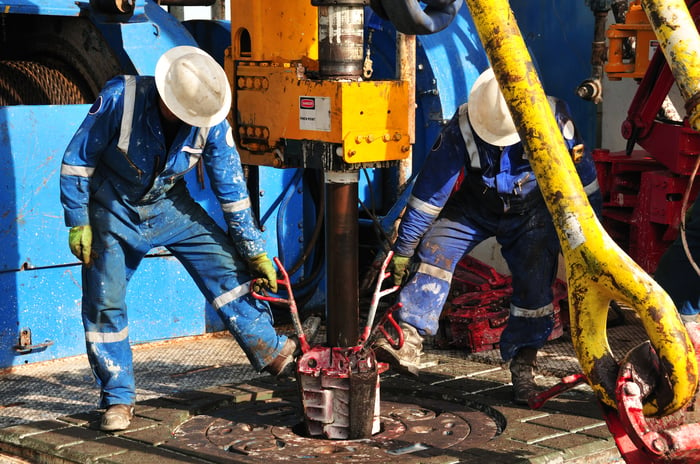If you invested $10,000 in Devon Energy (DVN 0.98%) one year ago, you would have around $10,900 today. If instead you had bought ExxonMobil (XOM 0.23%), you would have nearly $14,900. The same investment in Chevron (CVX 1.04%) would have netted you about $12,500. To understand why Devon Energy has lagged so far behind, you only need to look at the dividend.
What a yield!
Devon Energy has a huge yield of around 6.2% today. That compares favorably to Exxon and Chevron, which have dividend yields of 3.1% and 3.6%, respectively.
But Devon's yield was over 8% not too long ago. The stock price did shoot higher to push the yield lower (yield and stock price move in opposite directions), but the decline was a result of a lower dividend payout.
In fact, the stock fell when dividend payments become lower and kept the dividend yield more elevated than it otherwise would be.

Image source: Getty Images.
Devon's quarterly payment hit a peak in the third quarter of 2022 and has now been cut twice. It has fallen from $1.55 per share per quarter to $0.88 in just six months.
That drastic reduction was by design, because Devon's dividend is variable based on the company's financial results. Those results
are largely dictated by energy prices, which have fallen of late.
By comparison, Exxon and Chevron have continued to support their dividends. Exxon increased its payment in the fourth quarter of 2022, and Chevron announced its latest increase in January.
Big ups and big downs
Exxon and Chevron are global integrated energy giants with a long focus on safety and business continuity. Both have increased their dividends annually for over three decades.
That's particularly impressive given the highly cyclical nature of the energy sector, where commodity prices have a history of dramatic and often swift moves. Exxon and Chevron share a simple goal of continuing to reward investors with a reliable stream of dividends no matter what is going on with energy prices.
If you are a conservative dividend investor, perhaps looking to live off of the income your portfolio generates, that will likely be a good fit for you. But what if that isn't your goal? What if you are looking to find a way to benefit from rising oil prices?
Yes, an industry upturn will benefit Exxon and Chevron, but your upside would be limited by their generally conservative nature, to some degree.
Devon, on the other hand, would reward you with a growing dividend payment, which essentially leverages the stock to oil prices. In 2020, when energy prices were low, the annual dividend totaled $0.68 per share. In 2022, when oil prices were much higher, the full-year dividend was $5.17 per share.
Investors were clearly well rewarded via dividends over that span. But the stock also rose, as investors realized that higher energy prices would likely result in more cash flowing through to investors.
Looking at total return, which assumes the reinvestment of dividends, a $10,000 investment in Devon Energy three years ago would have grown to $30,000 today, vastly outdistancing what you would have if, instead, you had bought Exxon or Chevron (with returns of around $22,700 and $17,700, respectively). And that includes the share-price declines following Devon's recent dividend cuts.
DVN total return level data by YCharts.
The pullback in the dividend and Devon's stock price are, basically, just the other side of the pendulum swing of the energy sector. It shouldn't surprise investors. So who would want this kind of volatile energy exposure?
Perfect for the right investor
Investors who believe energy prices are going to move higher might want to leverage themselves to that belief by buying Devon Energy. That's a high-risk game, but one that many will be willing to play.
However, there's another way to think about Devon's dividend and energy sensitivity. For investors looking to protect themselves from the flow-through of rising energy prices into things like gasoline prices or home heating, owning Devon would likely mean getting an income boost just when you would be seeing increased living costs. In that way, it is a sort of inflation hedge. You just need to understand that falling energy prices will lead to a drop in the dividend income you collect.
All of that said, most investors will probably be better off erring on the side of caution. That means sticking with consistent dividend payers like Exxon and Chevron. Indeed, owning Devon is much more complicated, and appropriate for fairly engaged investors. And it isn't a good choice for the faint of heart.






